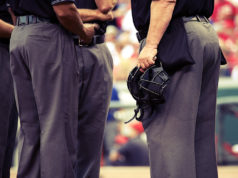There are practices that should always be followed when traveling with officiating partners to make sure everyone gets to the game on-time, and gets along with each other.
Assigners often encourage officials to ride together when possible. One rationale is security — officials can arrive and leave together. Irate fans are less inclined to accost a crew as opposed to individuals.
Another school of thought is that instead of putting wear and tear on multiple vehicles traveling to the same venue and burning more fuel, only one vehicle is needed. Some others find that traveling as a group fosters pregame discussions and develops rapport and camaraderie.
While all of those are legitimate theories, traveling together may pose some particular challenges from an etiquette standpoint. Whether you are pro or con when it comes to traveling as a crew or alone, consider the following points for drivers and riders.
For the driver
If you smoke, try to refrain while transporting the crew to the game site. Smoking is a health hazard for not only you but also for your crew as well (secondhand smoke affects others in the vicinity of the smoker).
Try to meet at a central location so that each crewmember has approximately the same distance home if at all possible.
Keep your vehicle’s interior relatively clean to accommodate the other riders. Take out any child seats, make sure the floors and seats are clear of clutter and make sure there is enough room for all equipment bags. That will improve the emotional climate of the ride.
Avoid speeding to your game site. That is particularly true if weather and road conditions are less than ideal. Your safety and that of your crew is more important than being late. Leave early enough to eliminate the need for hurry. If running late, call the supervisor and/or school to give them a heads up. The time you are trying to save is negated by the time sitting at the side of the road while the police officer is writing the ticket.
Be sure someone on the crew knows exactly where you are going or has a global positioning system. Ostensibly, the crew chief has been in contact with the game administrator and has confirmed the game site and where the officials are to park.
If the crew stops for refreshments after the game, take it easy on the alcohol. Again, safety takes precedence. Not to mention that an official who is ticketed for driving under the influence may find his or her future schedule and reputation negatively affected.
Passengers
Meet the driver at the designated place and on time. The drive should be relaxed rather than rushed or angst-filled because someone showed up late.
Offer to help the driver with the cost of fuel. He or she may not take it, but the gesture has value. Passengers can chip in to pay for the driver’s postgame meal or beverages as a way of showing appreciation.
Don’t smoke in the driver’s vehicle. Ask the driver if he or she allows snacks or non-alcoholic beverages to be consumed in the vehicle. If so, dispose of cans, bottles and wrappers rather than leaving them in the vehicle.
Don’t bother the driver to stop without good cause. Bathroom breaks are inevitable, but simply being hungry is not a reason to stop the driver en route. Don’t distract the driver; keep the noise down, be it music or conversation.
The ride home is not the time to heatedly debate calls from the game. A postgame evaluation is not only acceptable but encouraged. However, any such discussion should be professional and free of personal attacks on crewmates.
There are plenty of benefits to carpooling. But there are pitfalls as well. Avoid them and your crew will perform better.
What's Your Call? Leave a Comment:
Note: This article is archival in nature. Rules, interpretations, mechanics, philosophies and other information may or may not be correct for the current year.
This article is the copyright of ©Referee Enterprises, Inc., and may not be republished in whole or in part online, in print or in any capacity without expressed written permission from Referee. The article is made available for educational use by individuals.
















